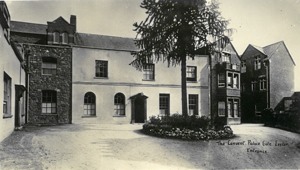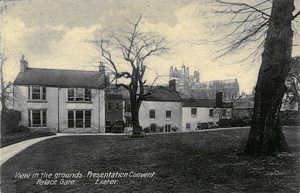
Exeter Stories
Exeter folk and friends in their own words - 1890's to the 1990's │ << Previous story │ Next story >> │
A Night to Remember
by Jean Thompson
I am about to tell you about a landmark event in my life which took place during World War II and am hoping readers find it interesting enough to read to the end. Here's a bit of ancient history to introduce this column: On March 28/29 1942, Royal Air Force bombers launched a massive air attack on Lubeck, Germany causing great damage and loss of life in a city with no major military targets. Predictably, retaliatory raids were carried out by the Luftwaffe including one I experienced as a young resident in a boarding and day school in Exeter, Devon. The school was adjacent to the Bishop's Palace and Cathedral and our address was Palace Gate, Exeter. A huge wall reputedly dating from the Roman occupation of Britain bisected the school property.
On May 3 1942, we went to bed on a balmy night with moonlight clearly illuminating the light colored stone of the Cathedral. After midnight we were awakened by air raid sirens followed by the whistle of bombs and explosions. We fled down to the cloakroom used as our bomb shelter because the ancient walls were 3 feet thick. It had a bricked up entrance to a tunnel which legend said monks used to access cathedral buildings prior to the Reformation. We felt the massive explosion of the bomb which hit the St James Chapel of Exeter Cathedral adjacent to the South Tower. A deluge of incendiary bombs then pummeled the city, causing massive fire damage and loss of life. An air raid warden informed us the classrooms above us were threatened by fire so we must evacuate the building. There were 30 or so resident students. Discipline was strong in this school, obediently we donned our coats over pajamas and emerged into a red inferno of burning buildings, smoke, dust and debris, fire engines and hoses everywhere. I have no memory of fear or tears from anyone - when told to walk we walked! Where would we go? The first route became impassable so the wardens suggested a circuitous route towards Topsham. I vividly remember a man atop a burning building who disappeared as it collapsed. We walked in two-by-two formation down any street still open towards a hoped for safe haven. Close to dawn, we arrived at a building where volunteers provided us with hot tea and blankets. We fell asleep on a dusty floor with broken glass in what may have been a primary school building.
About nine o'clock we were aroused and told we would all be sent home until damage was assessed and repaired and classes resumed. Rumor had it that some stone from Exeter Cathedral, or shrapnel had penetrated our dormitory roof. We must have been issued donated clothing before we reassembled into walking formation and headed back to the city to find transportation. The Great Western Railway station and its tracks were severely damaged preventing me from going home by rail. By now, main streets into the city had been cleared and dozens of double-decker buses had assembled to evacuate as many people as possible. With the city still burning fiercely it was feared the Luftwaffe would pay a return visit that night. (They did not). I was given a travel voucher and told to watch for a bus going in the direction of my home town which was in the same county. Some students who lived far away or in London were assigned accommodation with local families. There was a huge crowd waiting but about 2 PM I spotted a bus going to Newton Abbott and Torquay. Close enough! I climbed to the upper deck for a good view. As we left the smoldering city we emerged into a beautiful sunny spring day. As the bus climbed Telegraph Hill, the rocky tors of Dartmoor stood out to the north and the English Channel sparkled to the south. I fell asleep for a while, awakening when we neared Torquay. From there, another short bus ride and a half mile walk brought me to my home at last. I walked in and found my parents huddled beside the radio listening to the description of the devastation. They knew the school was at the epicenter of the bombing and the Cathedral was hit. All phone lines were down in Exeter so it was impossible to know who had survived the devastation. I was dirty and exhausted and after a hot bath, went to bed. The next day, I awoke with a throat so sore I couldn't swallow or talk. Our doctor made a house call and advised rest. I recovered within a week, then had impetigo around minor abrasions. Eventually, my belongings and school books were delivered along with the curriculum I must complete at home until we were recalled.
May 4th, 2013 is the 71st anniversary of this unforgettable event. Recently, I discovered my school had permanently closed in 1996. I am still vainly trying to find former friends who walked with me that memorable night. Some were younger than I but maybe I'm the last survivor of the group.
I don't believe I was emotionally scarred by the experience. In fact, I believe it gave me confidence to set out on adventures which led circuitously to my current existence here in Appleton, Wisconsin. During the past dozen years, a generation of children in Iraq, Afghanistan and now Syria have suffered multiple bombings, I hope they can recover and thrive without hatred.
Jean Thompson © 2013
 The Palace Gate Convent before the war.
The Palace Gate Convent before the war. The Convent from the garden.
The Convent from the garden.
│ Top of Page │